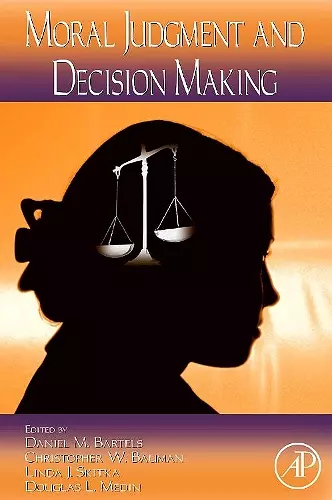Psychology of Learning and Motivation
Moral Judgment and Decision Making
Douglas L Medin editor Brian H Ross editor Daniel Bartels editor Christopher Bauman editor Linda Skitka editor
Format:Hardback
Publisher:Elsevier Science Publishing Co Inc
Published:9th Feb '09
Currently unavailable, and unfortunately no date known when it will be back

A thematic volume on Moral Cognition and Decision Making.
Presents a variety of perspectives from within and outside moral psychology. This title argues that causal models are the canonical representational medium underlying moral reasoning, and offers an account that makes use of linguistic structures and implicates legal concepts. It discusses the development of moral characters in children.This volume presents a variety of perspectives from within and outside moral psychology. Recently there has been an explosion of research in moral psychology, but it is one of the subfields most in need of bridge-building, both within and across areas. Interests in moral phenomena have spawned several separate lines of research that appear to address similar concerns from a variety of perspectives. The contributions to this volume examine key theoretical and empirical issues these perspectives share that connect these issues with the broader base of theory and research in social and cognitive psychology. The first two chapters discuss the role of mental representation in moral judgment and reasoning. Sloman, Fernbach, and Ewing argue that causal models are the canonical representational medium underlying moral reasoning, and Mikhail offers an account that makes use of linguistic structures and implicates legal concepts. Bilz and Nadler follow with a discussion of the ways in which laws, which are typically construed in terms of affecting behavior, exert an influence on moral attitudes, cognition, and emotions. Baron and Ritov follow with a discussion of how people's moral cognition is often driven by law-like rules that forbid actions and suggest that value-driven judgment is relatively less concerned by the consequences of those actions than some normative standards would prescribe. Iliev et al. argue that moral cognition makes use of both rules and consequences, and review a number of laboratory studies that suggest that values influence what captures our attention, and that attention is a powerful determinant of judgment and preference. Ginges follows with a discussion of how these value-related processes influence cognition and behavior outside the laboratory, in high-stakes, real-world conflicts. Two subsequent chapters discuss further building blocks of moral cognition. Lapsley and Narvaez discuss the development of moral characters in children, and Reyna and Casillas offer a memory-based account of moral reasoning, backed up by developmental evidence. Their theoretical framework is also very relevant to the phenomena discussed in the Sloman et al.,...
ISBN: 9780123744883
Dimensions: unknown
Weight: 630g
384 pages